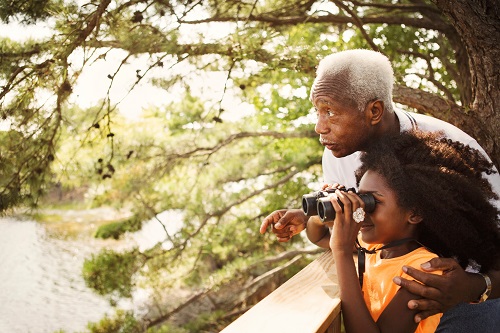 |
 |
 |
Vol. 27, No. 2
July 2024
Creating a Kin-First Culture
Placing youth with kin and non-relative kin or "kin-like" caregivers is a priority for North Carolina. The NC Department of Health and Human Services, Division of Social Services (NC DSS) is working to provide better services, support, and engagement with kin to ensure children can be placed with kin when it is appropriate and safe to do so. For example, North Carolina has implemented a partial board payment for unlicensed kinship caregivers to support more kin placements for children in foster care. This will help our state meet Goal 2 of its Child and Family Services Plan (CFSP), which is to "increase access to services for children and their families to keep children in the safest, least restrictive setting."
What is Kinship Care?
Kinship care is when adults agree to raise and provide care for a child they know when the child's parents cannot care for them. It may be needed for a short, long, or even permanent period. A kinship care placement can be the licensed or unlicensed home of a relative or kin-like caregiver.

What is Kin-First Culture?
A kin-first culture prioritizes young people's connections with kin or chosen family to promote a sense of belonging and connection to family history and culture. When the decision is made to remove a child from their home, kin should be the first option for placement (CFP, 2022).
In a kin-first culture, placement with kin is an expectation, not a practice exception or alternative. In such a culture, all children are placed safely with kin who receive caregiver resources and supports. According to Casey Family Programs (2023), agencies committed to a kin-first approach are:
- centered on the input of the children and their family,
- seek to explore and engage the whole family network, and
- strive to make every child's first - and only - placement with kin.
"In instances when placement with kin is not possible, the search for kin who can provide a safe home or connection for the child should be ongoing and include both maternal and paternal kin" (CFP, 2023).
Important components of a kin-first culture include:
- Leading with a kin-first philosophy.
- Developing written policies and protocols that reflect equity for children living with kin and recognize their unique circumstances. In kin-first systems, policies about diligent search, emergency placement protocols, licensing, training, permanency options, and financial supports speak to the needs and role of kin caregivers.
- Identifying and engaging kin for children at every step.
- Creating a sense of urgency for making the first placement a kin placement.
- Making licensing of kin a priority.
- Creating a strong community network to support kin families.
For more on these components, please refer to "Creating a Kin-First Culture" from the American Bar Association's Child Law Practice Today (Miller, 2017).
Benefits and Outcomes
A systematic review of more than 100 studies (CFP, 2019) found that when compared with children in non-relative foster care, children in kinship care have:
- More stable placements and greater likelihood of being placed with their siblings.
- Lower rates of re-abuse and institutional abuse.
- Better behavioral, emotional, and mental health (i.e., fewer internalizing and externalizing behaviors, better adaptive behaviors, fewer psychiatric disorders).
- Higher likelihood of achieving permanency with their relative caregivers to maintain life-long connections with their family if they are unable to safely return home.
Public-Private Partnerships Support Kin-First Culture

Alice Moore

Amy Lawson
Links to Helpful Websites and Resources
- https://www.ncdhhs.gov/kinshipcare - For more information and resources regarding kinship/relative care from the NCDHHS.
- https://www.ffa-nc.org/ - Foster Family Alliance of North Carolina is a family-led, nonprofit organization supporting children and youth in foster care and the dedicated families and professionals that care for them.
- https://fosteringnc.org/kinship-care/ - For more information, the kinship page on the learning site for North Carolina foster and adoptive parents and kinship caregivers features a collection of courses and other resources of special interest to kinship caregivers.
- https://www.casey.org/media/Lever-2-Advancing-a-Kin-First-Culture-Discussion-Guide.pdf - The guide, "Advancing a Kin-First Culture," includes short videos, discussion questions, and key resources and tools for child welfare leaders and stakeholders.
- The federal government recently gave child welfare agencies the option to use kin-specific foster care licensing standards. This will allow more children to be cared for by people they know and love and for those relative caregivers to be financially supported. NC DSS is developing policy and a process for a kin-specific licensure track.
- https://ncswlearn.org/ - Be on the lookout for a new course for social workers on https://ncswlearn.org/ called "Kinship Care and Child Welfare". This course will include information and resources, including videos from social workers about what they do to create a kin-first culture.
To find out how a kin-first culture is being created by one public-private partnership, Practice Notes staff spoke with Alice Moore, Social Work Supervisor at New Hanover County Health and Human Services, and Amy Lawson, Director of Foster Care for Boys & Girls Homes of North Carolina. Moore and Lawson's agencies are part of the Kinship Therapeutic Foster Care program, a grant-funded project in which kin and kin-like caregivers receive specialized training and support to become licensed kinship therapeutic foster parents.
Moore and Lawson shared the following strategies and tips for creating public-private partnerships to support a kin-first culture:
- Assess interest, willingness, and capacity at all levels and ask for volunteers if your agency is considering a public-private partnership.
- Begin with brainstorming meetings attended by both agencies to establish a partnership plan, clear roles and expectations, and open communication.
- Establish a small group of 3-4 staff from each agency who can consistently attend meetings; the team lead should be in a middle management position.
- Make sure upper management participates from the outset in messaging to promote kin-first goals and practices.
- Embed the kin-first culture throughout the agency so all staff ask questions about kin in all cases.
- Regularly scheduled check-ins, trust, and open communication help with effective problem-solving, identifying solutions, and moving the work forward.
- Gain the support of your legal team and judges.
- Consider pursuing grants to hire a kinship-specific worker.
- Get kin families into training or provide one-on-one training within a couple of weeks if they express interest in being licensed.
Major impacts of this partnership in New Hanover County cited by Moore and Lawson include the following:
- More children achieving permanence-including teens-who would not have achieved it otherwise.
- Kinship providers have a higher capacity for meeting children's complex needs.
- More kin families are getting licensed.
- Some kinship providers continue to foster other children even after their relative child or youth reunifies. A number have gone on to be amazing foster parents to non-kin placements.
- Children's placements are more stable and more family connections are identified.
- Many youth have received support through KinGAP (see below for more about KinGAP).
Kin-First Culture Action Steps
According to NC DSS permanency planning policy (2024), county child welfare agencies must make diligent efforts to identify and locate extended maternal and paternal family members as soon as a county child welfare services agency becomes involved with a child/youth and continue throughout the case (p. 16). These efforts should be made with a sense of urgency to find kin connections. The goal of identifying kin is to promote connections for children and youth and to create more options for support and planning for the family, parents, children, and youth.
At least once a month, county child welfare workers must ask parents and children about extended family members to learn:
- Their names and when they were last seen by the family,
- Where they are located (including addresses and contact information),
- How the parents and children are in touch with them (e.g., phone calls, Facebook, etc.), and
- What the parents' or children's relationship with them is like (i.e., history with that relative, support that relative may be able to provide, etc.).
Support and Resources
One of the best ways to support kin and kin-like caregivers is to ensure they receive the resources they need. A few helpful resources include:

Mary Mackins
- The Kinship Foster Care and Guardianship Assistance Program (KinGAP)
KinGAP offers financial assistance and Medicaid for youth who are determined to be in a permanent family setting and unlikely to obtain permanency through reunification or adoption. This is helpful to guardians responsible for the day-to-day care and supervision of these youth. - Caring for Our Own
This kinship-specific training curriculum provides families support with the experiences common to kinship care. - Know Your Options Resource Guide
This guide for kinship families provides information about foster care, adoption, and guardianship. Empowering kinship caregivers with information about permanency options is an important part of being a kin-first agency.
"It's important that we aim to keep children within their family unit or maintain those connections. Early in the case, we must begin to identify and engage relatives and other natural supports with families and continue throughout the case. It's our responsibility to encourage and support relatives to become a resource and hold ourselves accountable for the outcome of our efforts," Mary Mackins, NC DSS Adoptions Manager.
